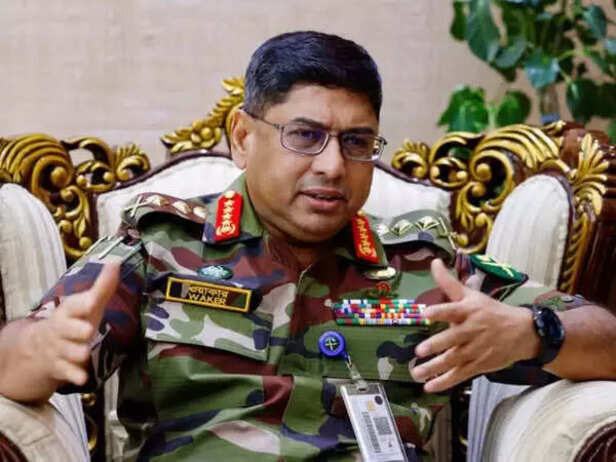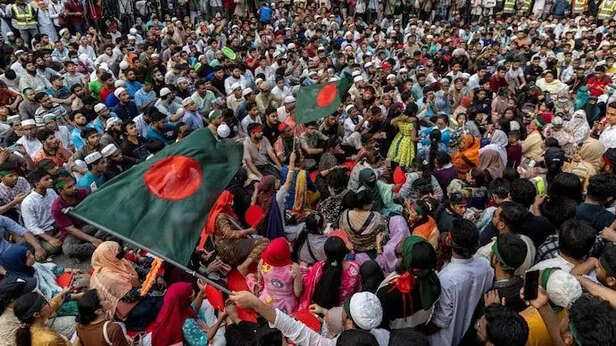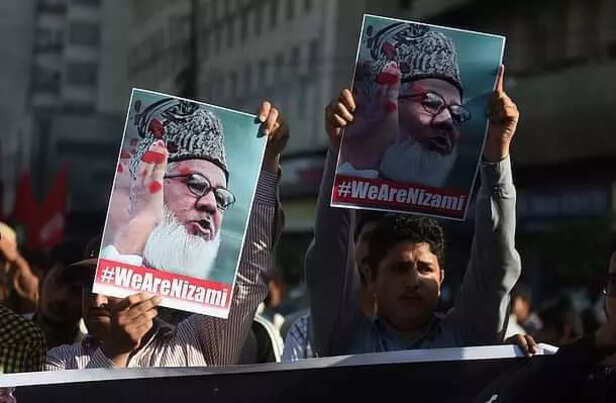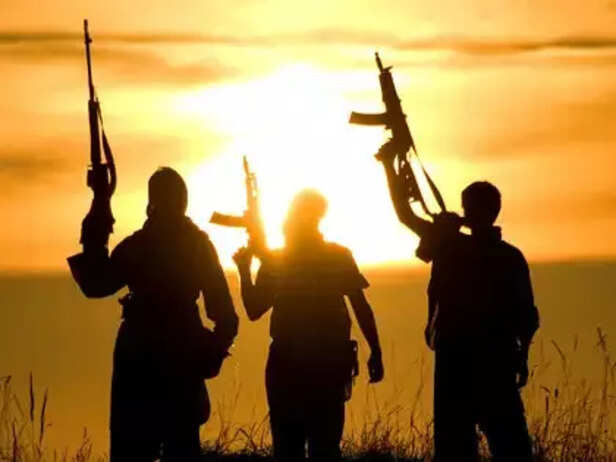Muhammad Yunus Threatens To Resign Amid Political Standoff—Bangladesh On Edge Of Another Coup?
Ankit Gupta | May 23, 2025, 19:19 IST
( Image credit : Times Life Bureau, Timeslife )
Muhammad Yunus, the head of the interim government in Bangladesh, threatened to resign if all the parties didn't offer him their full support. This came a day after Army Chief General Waker-Uz-Zaman called for elections to be held by December and the BNP sought a road map for polls. Yunus' resignation buzz is being seen as a ploy to launch a fresh agitation in Dhaka.
The political crisis in Bangladesh deepened dramatically on Thursday after Muhammad Yunus, head of the caretaker government, threatened to resign unless all political parties extended their unconditional support to his administration. His statement has triggered fears of renewed street protests and raised the specter of a possible military intervention in the fragile South Asian democracy.
The resignation warning came just a day after Army Chief General Waker-Uz-Zaman issued a rare political statement, calling for national elections to be held no later than December. The Bangladesh Nationalist Party (BNP), in turn, demanded a detailed and credible roadmap to elections — something Yunus has yet to deliver.
Political analysts and civil society observers warn that the situation is nearing a tipping point. Yunus’ resignation threat is being interpreted by some as a tactical maneuver — either to consolidate control through public sympathy or to create conditions ripe for external intervention. Others fear it is a sign of an unraveling state apparatus, opening the door to a military-led transition.

The unusually public statement by the army chief is fueling speculation that the military is preparing to assert greater influence. While General Waker-Uz-Zaman has stopped short of calling for direct rule, his assertive tone signals a break from the military's traditional hands-off posture since the democratic restoration in 1991.
“This is not business as usual,” said a senior political scientist at Dhaka University, requesting anonymity. “When the army speaks about election deadlines, it means the constitutional vacuum is being noticed at the highest levels — and that is never a good sign.”
Historical precedents add gravity to the speculation. Bangladesh has experienced several military takeovers since its independence in 1971. In 2007, amid a similar political standoff, the military-backed caretaker government took control for nearly two years, suspending democratic processes. Comparisons to that period are now being drawn with increasing frequency.

Meanwhile, the streets of Dhaka are tense. Supporters of the BNP and other opposition parties are mobilizing, viewing Yunus' threat as a signal that the current administration is both unwilling and unable to hold free and fair elections. Protests are expected to intensify over the weekend, with security forces already on high alert.
Social media is abuzz with rumors of internal divisions within the army, adding another layer of anxiety to an already volatile situation. Civil rights organizations have urged restraint and dialogue, warning that any disruption of the democratic order could lead to long-term instability and international isolation.
Much now hinges on Yunus’ next move. If he follows through on his threat to resign without a consensus, the constitutional chain of command could collapse, paving the way for either a military-backed government or extended emergency rule.
International actors, including the United Nations, the European Union, and the United States, have expressed concern over the political impasse, urging all stakeholders to uphold democratic norms and ensure a peaceful transition.
For ordinary Bangladeshis, however, the crisis has already begun to take a toll. Inflation is climbing, foreign investment is slowing, and fears of violence loom large. As the political drama unfolds, the country once hailed for its economic resilience now stands on the precipice of uncertainty — and possibly, history repeating itself.
India Must Act Decisively Against Jihadi Elements and

As Bangladesh teeters on the edge of political unrest, the situation presents both a challenge and a strategic opportunity for India. What unfolds in Dhaka in the coming days will not remain confined to its borders — it will ripple across the region, especially in West Bengal, Assam, and the North East, where history has already shown how porous borders and ideological spillovers can destabilize India's national security.
India has long maintained a policy of non-intervention when it comes to its neighbors’ internal politics. Yet when radical groups, jihadist networks, and foreign-funded propaganda machines actively operate from Bangladeshi soil with the singular aim of fomenting unrest within Indian territory, restraint becomes weakness — and silence becomes complicity.

Over the last few years, multiple intelligence inputs have confirmed the presence of anti-India cells operating in border districts of Bangladesh. Groups with ties to global jihadist networks like Jamaat-ul-Mujahideen Bangladesh (JMB), Harkat-ul-Jihad al-Islami (HuJI), and other Islamist outfits have been found spreading propaganda, recruiting youth, and even planning attacks on Indian soil.
These are not isolated incidents. Radical preachers, funded often by Gulf-based organizations and sometimes backed by political factions with a history of sympathizing with jihadist ideology, have created a dangerous ecosystem of hate and disinformation aimed squarely at India.
In recent times, pro-Pakistani narratives and distorted versions of Indian history and politics have been circulated via social media platforms originating in Bangladesh. They target India's communal harmony, question its sovereignty in Kashmir, and call for Islamic solidarity against “Hindu oppression.” This isn't free speech. This is psychological warfare.
India cannot afford to remain passive. While diplomacy must remain the first line of engagement, it must be reinforced with intelligence-based operations, cyber countermeasures, and regional strategic deterrence.
India must make it absolutely clear — through action, not just words — that it will not tolerate any platform, proxy, or preacher that incites violence or spreads anti-India narratives from foreign soil. National security is not a matter of negotiation. It is a red line.
Bangladesh, a nation with shared cultural roots and intertwined economic destinies with India, must not become a launching pad for extremist ideologies. If rogue elements are allowed to hijack the narrative under the garb of political protest or religious grievance, it is not just India that will burn — Bangladesh too will suffer in the long run.
The time for passive observation has long passed. The storm clouds are gathering in Dhaka, and India must be prepared — not just to watch, but to act.
The resignation warning came just a day after Army Chief General Waker-Uz-Zaman issued a rare political statement, calling for national elections to be held no later than December. The Bangladesh Nationalist Party (BNP), in turn, demanded a detailed and credible roadmap to elections — something Yunus has yet to deliver.
Political analysts and civil society observers warn that the situation is nearing a tipping point. Yunus’ resignation threat is being interpreted by some as a tactical maneuver — either to consolidate control through public sympathy or to create conditions ripe for external intervention. Others fear it is a sign of an unraveling state apparatus, opening the door to a military-led transition.
Military in the Wings?

General Waker-Uz-Zaman, Bangladesh army chief wants elections 'by December'
( Image credit : Times Life Bureau )
The unusually public statement by the army chief is fueling speculation that the military is preparing to assert greater influence. While General Waker-Uz-Zaman has stopped short of calling for direct rule, his assertive tone signals a break from the military's traditional hands-off posture since the democratic restoration in 1991.
“This is not business as usual,” said a senior political scientist at Dhaka University, requesting anonymity. “When the army speaks about election deadlines, it means the constitutional vacuum is being noticed at the highest levels — and that is never a good sign.”
Historical precedents add gravity to the speculation. Bangladesh has experienced several military takeovers since its independence in 1971. In 2007, amid a similar political standoff, the military-backed caretaker government took control for nearly two years, suspending democratic processes. Comparisons to that period are now being drawn with increasing frequency.
Public Tensions Rise

Massive Protest in Dhaka
Meanwhile, the streets of Dhaka are tense. Supporters of the BNP and other opposition parties are mobilizing, viewing Yunus' threat as a signal that the current administration is both unwilling and unable to hold free and fair elections. Protests are expected to intensify over the weekend, with security forces already on high alert.
Social media is abuzz with rumors of internal divisions within the army, adding another layer of anxiety to an already volatile situation. Civil rights organizations have urged restraint and dialogue, warning that any disruption of the democratic order could lead to long-term instability and international isolation.
What’s Next?
International actors, including the United Nations, the European Union, and the United States, have expressed concern over the political impasse, urging all stakeholders to uphold democratic norms and ensure a peaceful transition.
For ordinary Bangladeshis, however, the crisis has already begun to take a toll. Inflation is climbing, foreign investment is slowing, and fears of violence loom large. As the political drama unfolds, the country once hailed for its economic resilience now stands on the precipice of uncertainty — and possibly, history repeating itself.
India Must Act Decisively Against Jihadi Elements and Anti-India Propaganda

Jihad is more vocal in Bangladesh
As Bangladesh teeters on the edge of political unrest, the situation presents both a challenge and a strategic opportunity for India. What unfolds in Dhaka in the coming days will not remain confined to its borders — it will ripple across the region, especially in West Bengal, Assam, and the North East, where history has already shown how porous borders and ideological spillovers can destabilize India's national security.
India has long maintained a policy of non-intervention when it comes to its neighbors’ internal politics. Yet when radical groups, jihadist networks, and foreign-funded propaganda machines actively operate from Bangladeshi soil with the singular aim of fomenting unrest within Indian territory, restraint becomes weakness — and silence becomes complicity.
A Quiet Surge in Anti-India Radicalism

India bans Jamaat-ul-Mujahideen Bangladesh terror outfit back in 2019
Over the last few years, multiple intelligence inputs have confirmed the presence of anti-India cells operating in border districts of Bangladesh. Groups with ties to global jihadist networks like Jamaat-ul-Mujahideen Bangladesh (JMB), Harkat-ul-Jihad al-Islami (HuJI), and other Islamist outfits have been found spreading propaganda, recruiting youth, and even planning attacks on Indian soil.
These are not isolated incidents. Radical preachers, funded often by Gulf-based organizations and sometimes backed by political factions with a history of sympathizing with jihadist ideology, have created a dangerous ecosystem of hate and disinformation aimed squarely at India.
In recent times, pro-Pakistani narratives and distorted versions of Indian history and politics have been circulated via social media platforms originating in Bangladesh. They target India's communal harmony, question its sovereignty in Kashmir, and call for Islamic solidarity against “Hindu oppression.” This isn't free speech. This is psychological warfare.
India Needs Strategic Decisiveness, Not Complacent Diplomacy
- Surgical Intelligence Operations: Indian intelligence agencies must be given a free hand to surgically dismantle jihadist sleeper cells operating across the border. This must include digital tracking, funding cutoffs, and blacklisting of radical clerics with known anti-India leanings.
- Diplomatic Pressure on Dhaka: While India values its historic relationship with Bangladesh, it must send a clear and unambiguous message to the government in Dhaka — either crack down on anti-India groups with sincerity, or risk a freeze in bilateral cooperation, including trade and infrastructure investments.
- Cyber Counter-Offensive: A coordinated cyber response to online propaganda originating in Bangladesh is essential. India must use its digital capacity to not only expose these lies but to break the machinery that manufactures them — with evidence, legal targeting, and if needed, covert shutdowns.
- Border Management: The Indo-Bangladesh border, particularly in West Bengal and Assam, needs to be sealed tighter than ever before. Cross-border infiltration must be treated as an act of terrorism, not just illegal migration.
No Room for Jihad on India’s Doorstep
Bangladesh, a nation with shared cultural roots and intertwined economic destinies with India, must not become a launching pad for extremist ideologies. If rogue elements are allowed to hijack the narrative under the garb of political protest or religious grievance, it is not just India that will burn — Bangladesh too will suffer in the long run.
The time for passive observation has long passed. The storm clouds are gathering in Dhaka, and India must be prepared — not just to watch, but to act.
